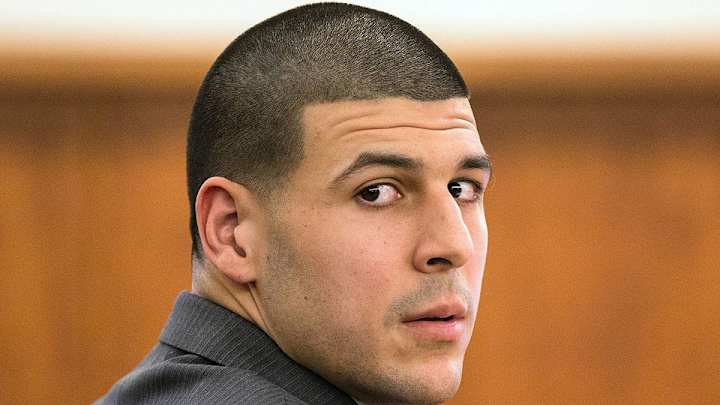Video evidence presented, more from Aaron Hernandez murder trial Day 4

Was Aaron Hernandez friends with Odin Lloyd, the man he’s accused of killing?
This question remained the focus of Commonwealth of Massachusetts v. Hernandez on Wednesday, the fourth day of the trial. Hernandez’s lawyers want jurors to believe that Hernandez and Lloyd were close friends who genuinely cared about each other. Jurors would then be more inclined to surmise that Hernandez would never want Lloyd dead. Bristol County (Mass.) prosecutors, in contrast, hope jurors regard Hernandez and Lloyd as two guys whose interactions arose from mere happenstance. They happened to date two sisters, Shayanna and Shaneah Jenkins, and they happened to share a passion for smoking marijuana. From this light, jurors would view Hernandez as placing minimal value in preserving a relationship with Lloyd. Jurors would then be more likely to infer that if Hernandez felt betrayed or infuriated by Lloyd, the former New England Patriot star would be willing to murder him.
• SI's Super Bowl coverage | Seahawks open as early Super Bowl 50 favorites
Shaneah Jenkins (Lloyd’s girlfriend) was back on the stand on Wednesday to address this topic. It was her third day as a witness and she continued to portray Hernandez and Lloyd as drug companions rather than as friends. Jenkins, however, faced cross-examination for the first time. Hernandez attorney Charles Rankin repeatedly made Jenkins acknowledge that Hernandez and Lloyd often spent time together. While doing so Jenkins admitted that Hernandez and Lloyd jointly attended clubs and parties. Jenkins also answered “yes” in response to Rankin’s question if Hernandez and Lloyd “enjoyed each other’s company.” Nonetheless Jenkins insisted that Hernandez and Lloyd typically spent time with one another to smoke marijuana. She added that the other circumstance in which Hernandez and Lloyd usually appeared together was when Jenkins and her sister met up.
The slight but important difference between “stressed” and “shaken up”
Jenkins also testified about her recollection of Hernandez in the aftermath of Lloyd’s death. She recalled that Hernandez seemed “stressed” and secluded, with almost no appetite. Rankin pounced on Jenkins’ testimony to remind her that during her grand jury testimony in 2013, Jenkins described Hernandez as “shaken up.”
The difference between “stressed” and “shaken up” may seem inconsequential. Both descriptions refer to someone who seems anxious or worried. But choice of words matters tremendously to litigators, as even minor linguistic differences can prove critical. Remember, jurors will incorporate every phrase used to describe Hernandez to imagine him right after Lloyd’s death. Jurors might envision Hernandez very differently if he was “stressed” rather than “shaken up.” If Hernandez was “stressed,” was he worried that he had done something wrong? If Hernandez was instead “shaken up,” was he upset that his friend, Odin, had just died? Every word and every phrase matters in a trial, and Rankin wisely recognized the seemingly minor but possibly meaningful distinction in Jenkins’ testimonies.
Judge dismisses juror, more from Aaron Hernandez murder trial Day 3
Video evidence also plays key role in today’s proceeding
To augment Shaneah Jenkins’ testimony, prosecutors introduced as evidence a surveillance video taken in Hernandez’s North Attleboro (Mass.) home of Jenkins hugging her sister. The video shows Shayanna Jenkins consoling Shaneah, who had only hours earlier learned that her boyfriend was dead.
The video also displays behavior by Shayanna Jenkins likely to play a more central role as the trial advances: she is holding a bag. The bag, described by Shaneah Jenkins as a trash bag, could relate to suspicions by prosecutors that Shayanna Jenkins disposed of a gun (a .45-caliber Glock pistol) allegedly used by Hernandez to kill Lloyd. Shayanna Jenkins faces perjury charges for giving testimony to grand jurors that contradicted testimony of maids hired to clean Hernandez’s home. Prosecutors reportedly have offered Shayanna Jenkins immunity if she testifies against Hernandez, meaning she would not be charged with accessory after the fact for assisting in the coverup of a crime. Signs, however, suggest that Shayanna Jenkins has refused the immunity offer and won’t implicate Hernandez.
Odin Lloyd’s mother testifies and helps prosecution’s case
Ursula Ward, Lloyd’s mother, also testified on Wednesday. She calmly identified her son in a photograph and affectionately retold some of his life story. She later testified that the last time she saw Lloyd was on June 16, 2013, only hours before he was executed in an industrial park located less than a mile from Hernandez’s home.
Key issues in murder trial of former Patriots tight end Aaron Hernandez
Ward’s testimony made clear that she regularly saw her son, a contextually important point for jurors in assessing whether Lloyd and Hernandez were friends. Prosecutor William McCauley asked Ward if she was familiar with Lloyd’s friends. She said yes and then named several of her son’s friends, none of whom was named Aaron Hernandez. McCauley then asked if she knew Hernandez. She said no and had never met him.
Ward’s testimony was short but impactful. If jurors were unsure about whether Hernandez and Lloyd were friends after hearing from Shaneah Jenkins, they likely moved closer to regarding them as “not friends” after hearing from Ward. Here’s why: if Ward knew her son’s friends, why didn’t she know Hernandez? This seems especially strange given that Hernandez is engaged to the sister of her son’s girlfriend. The stark unfamiliarity displayed by Ward toward Hernandez could be the most significant development in the trial to date.
Michael McCann is a Massachusetts attorney and the founding director of the Sports and Entertainment Law Institute at the University of New Hampshire School of Law. He is also the distinguished visiting Hall of Fame Professor of Law at Mississippi College School of Law.

Michael McCann is a legal analyst and writer for Sports Illustrated and the founding director of the Sports and Entertainment Law Institute (SELI) at the University of New Hampshire School of Law, where he is also a tenured professor of law.